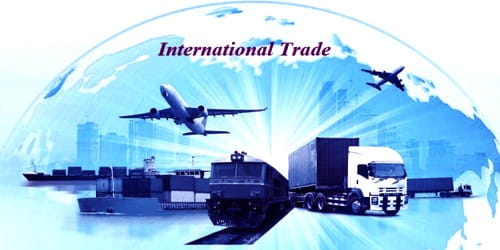International trade is the exchange of capital, goods, and services across international borders or territories, which could involve the activities of the government and individual. It is the exchange of goods and services across country borders. It arises from the fact that no country is self-sufficient in term of producing all the goods and services that it requires. It is also called foreign trade.
This type of trade gives increase to a world economy, in which prices, or supply and demand, affect and are affected by global events. It allows firms to fight in the worldwide market and to utilize competitive pricing for their products and services. It is also one of the important sources of revenue for a developing country.
International trade consists of goods and services moving in two directions:
- Imports – flowing into a country from abroad. It involves purchasing of goods and services from other countries.
- Exports – flowing out of a country and sold overseas. It involves the sale of goods and services to other countries.
It can be subdivided into 3 types.
- Export trade
When a trader of home country sells his goods to a trader located to another country, it is called export trade. Example – A trader from India sells his goods o a trader located in India.
- Import trade
When a trader of home country purchases his goods to a trader located in another country, it is called import trade. Example – A trader from India purchased his goods to a trader located in India.
- Entrepot Trade
When goods are imported from one country and then re-exported after doing some processing, it is called entrepot Trade. It refers to the purchase of goods from one country and then selling them to another country after some processing operations. Example – An Indian purchase some raw materials from Japanese trader then convert it into finished goods and re-export it to American trader.
Advantages
- Comparative Advantage
Trade encourages a nation to specialize in producing or supplying only those goods and services which it can deliver more effectively.
- Economies of Scale
Producing in higher volumes provides greater economies of scale. In other words, the cost of producing each item is lower.
- Transfer of Technology
Transfer of technology goes from the originator to a secondary user. In fact, that secondary user is often a developing nation.
- Improves financial performance
This allows them to augment the returns they achieve on their investments into research and development.
- Encourages market competitiveness
When a brand and business compete in several markets simultaneously, then it must focus on its competitiveness for it to be able to thrive.
Disadvantages
- Over-Specialization
Employees might lose their jobs in large numbers if global demand for product declines.
- New Companies
Find it much harder to grow if they have to compete against giant foreign firms.
- National Security
If a country is totally dependent on imports for strategic industries, it is at risk of being held to ransom by the exporter(s).
- Severe exchange rate risks
Many businesses focus on emerging markets for their products or services because it can greatly extend the lifespan of them.
- Increases the risk of proprietary information theft
Going into an international market with a product or service increases the risk of another brand or business burglary proprietary information, marketing concepts, or even an individual characteristic.
Barriers to International Trade –
- Difference in currency
- A difference in language, culture, and beliefs
- Political instability
- Distance, Transportation, and communication
- Government policy
- The difference in the legal system and emigration laws.
Nowadays, international trade has become essential, but a country has to keep appropriate stability between imports and exports to make sure that the financial system stays on the growth path.















